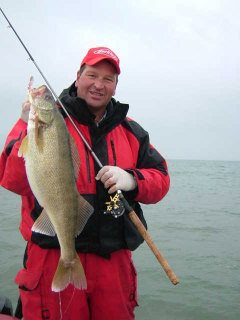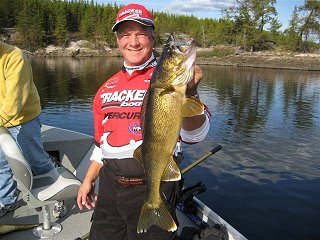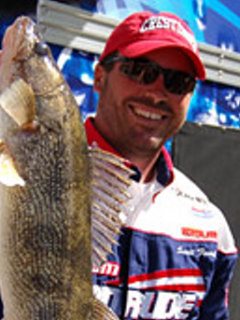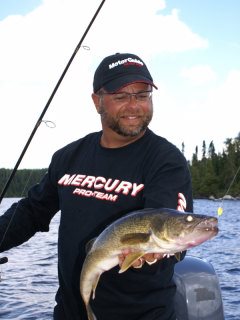Walleye First Tournament Series Part 13, Competitive Fishing and Life
Category: article
May 29th, 2013 by OutdoorsFIRST
Modified May 29th, 2013 at 12:00 AM
Author’s Note: The status of the walleye tournament world with a vision for the future will be explored throughout this series. Industry leaders, observers, participants (past and present), sponsors, professional and amateur anglers, host communities, marine and tackle manufacturers, and tournament organizers will share their wisdom and insights.
Part 13 offers a different perspective on pro anglers. Instead of them teaching the rest of the world about fishing and all aspects of competitive fishing, this article turns the tables. A number of respected pros were asked two questions:
What did competitive tournament fishing teach you about yourself?
And, What did competitive fishing teach you about life?
What a person does defines who that person is. How well an individual succeeds paints an even better picture. Four winners in the world of professional walleye fishing, Mark Martin, Scott Fairbairn, Daryl Christensen and Mark Brumbaugh share their insights. The two Marks are still tournament fishing and involved extensively in fishing promotions. Daryl hung up his pro walleye shield and moved into the world of birding, habitat and conservation work. Scott’s path took him from the boat seat to a MBA degree to the corporate world of 3M.
What did competitive tournament fishing teach them about themselves?
 |
|
|
Mark Brumbaugh
|
Mark Brumbaugh: “It’s the little things you have to keep an eye on. Always check the weakest link and fix it. Replace parts that could become an issue. Like life, think ahead and be proactive. Always be prepared for what may be thrown at you and be ready to react to whatever happens. I also learned I could compete with the best in the world, but fishing and life is a learning process – you never stop learning.”
Daryl Christensen: “I learned I was tougher physically and mentally than I thought. I also realized I was sometimes more selfish than I liked, missing many family events to pre-fish or travel the country speaking. I also learned new techniques and that I could become good enough to compete using them. Most importantly, I know the career I had would not have been possible without my faith in God and the support from my wife Sherry. I know I made it all those years on tour due to people who believed in me and helped me along the way be a better fisherman, promoter, husband, father and friend.”
Scott Fairbairn: “Tournament fishing taught me that my greatest strength is efficiency. I learned early on from Hall of Fame angler Mike McClelland that there are two types of tournaments – those that require a trophy-hunter’s mentality and those that demand an efficiency expert. The trophy hunter is patient, waiting for something big to happen, like Pete Harsh and Bruce Samson. In my case, I preferred to simply be more efficient than the competition. The world of efficiency is where I thrive. When I am in a ‘catch the mostest the fastest’ situation, I have more fun, rather than waiting for something big to happen. This was the key driver in my decision to move on from competitive angling. I preferred the early days of competitive walleye fishing where we were on the best bodies of water at the best times and it became an old-fashioned shoot-out. The trend toward scheduling events at time when the pros ‘should’ be able to catch something in combination with no-cull rules really moved the sport away from my wheelhouse and made it less enjoyable.”
 |
|
| Daryl Christensen |
Mark Martin: “Most of all, I know today that I should have paid more attention in school. To be successful, I have to do much more than just catch fish. I have to be a writer, a speaker, a teacher, a financial expert, a TV personality, a guide, a scheduler, a time-manager, and so much more. It took more than me to get where I am. It took the Lindners, Sura, Roach, Gofron, Brumbaugh and many others to make me a better person. They are part of who I am. To expand my horizons and skills, I listened to the experts. Tournament fishing taught me about myself and that soaking up their advice was the path to success. I also saw how important it was to be enthusiastic even when the last tournament kicked me in the butt. The rest of the world looks at you when you should be down, and how you react shows them who you really are. I visited my old school and the teachers there all were amazed that I made something this big from fishing. I admitted to them, that it would have been easier if I had listened all those many years ago.”
What did competitive fishing teach you about life?
Mark Brumbaugh: “Life’s short. Appreciate it. People come and go. I lost both parents and a number of really good tournament friends. These realizations calmed me down and I don’t get as excited over things I don’t have control over. Deal with it, whatever it is. There are wins and bad performances. Accept the bad and smile at the good. Competitive fishing took me from a 9 to 5 job to a 7-day a week self-employed job, something I would never have done otherwise. I work just as hard no matter the results of the last tournament. I also know it’s not about me, but all those who sponsor me and allow me to do what I love to do. My fishing family is a part of my real family. These relationships and friendships will last forever.”
Daryl Christensen: “Competitive fishing taught me about self-motivation. Get up early every day. Get on the water. Drive 30,000 miles a year – day and night. Run from tournament to tournament. Speak at events big and small. I learned to dot the I’s and cross the T’s, which as a small-town guide, I wasn’t very good at before big-league tournament fishing. I also learned that finishing second or last could be failure and never to take a bad tournament personally. Success could be a money finish or a top-10, depending on the circumstances.”
 |
|
|
Scott Fairbairn
|
Scott Fairbairn: “The single most important lesson is a simple truth for fishing and life. It doesn’t matter about today. What really matters is what is about to happen. The very best tournament anglers can predict what is next. Practice is the now, but truly great anglers know what is going to happen next. People joke and say a guy like Mike Gofron is part walleye. There may be a grain of truth in that. However, what makes him so good is that he isn’t hung up on what is happening the day before the tournament. He is thinking like a walleye in order to predict where the fish will be and what they will do next. In life, the same is true. The ability to forecast is not easy. It requires a tremendous amount of experience and analysis to see the future based on current trends. The greatest gains go to those who know what is coming next.”
Mark Martin: “Tournaments results are up and down. Like life, it’s necessary to roll with those ups and downs. I set out to do well, maybe even win along the way, and these fishing goals taught me to strive harder in all aspects of my life. I also know that my mistakes and decisions on the water cost me. But, I learn and get back on track. I also know that most people are good at something, and I try to learn from them. I have worked with a group of very good friends, and sharing with them has helped us all get ahead. Listening could be the biggest part of communicating. I love what I’ve been doing for 30 years, and encourage young people to do in life what they love.”
 |
|
|
Mark Martin
|
Author’s Note: These pro anglers have seen it all, and their observations and answers to questions about matters slightly removed from hooks, boats and walleyes prove very interesting.